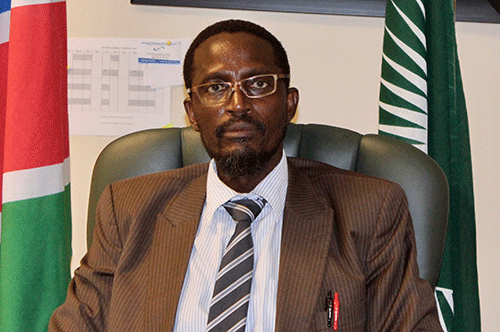*marriage application, objection, publication on cards
*deals same-sex marriages a blow
In the near future, people desiring to wed will need to submit marriage applications, which will be featured in newspapers for public scrutiny.
This clause, mandating prospective couples to submit applications for their intended marriages, forms part of the draft Marriage Bill that is set to be tabled next month. These marriage applications, open for public scrutiny, imply that if anyone objects to the proposed marriage, the marriage in question will be postponed until the matter is resolved.
“There will be hearings, whereby the person objecting to the marriage will have to give reasonable grounds as to why they don’t want that marriage to take place, and the other person will also be heard,” explained home affairs deputy minister Daniel Kashikola while addressing community members in the Oshikoto region during a recent outreach exercise by his ministry.
Grace period
However, if a marriage application has no objection, then that couple will be required to get married within 90 days.
“If after 90 days you didn’t marry that person, you have to reapply,” said Kashikola.
This, the politician said, will protect Namibians from falling prey to fraudulent marriages.
He highlighted that the ministry has come across cases in which people are making payments to enter into marriages, solely for their own gain, leading to uncertainty when one party fails to hold their end of the bargain.
“Someone will agree to get married and they will be paid – maybe N$2 000 per month. This mainly happens when one party is trying to make a living – and when one day that person wants to genuinely get married, they will be stranded because according to our records, that person is already married,” noted Kashikola.
He added that grievances have also arisen, particularly among women, who have been promised marriage, only to later discover that their partners are already married to other people.
“If the bill is passed, one can’t marry without applying to marry that person, and you need authorisation to marry that person. It is that authorisation that they can take to church for the traditional wedding to take place.”
Ekandjo bill
If passed, the new Marriage Bill will replace the current marriage law.
This will effectively render the proposed amendments to the Marriages Act of 1961, championed by liberation struggle icon Jerry ‘Maudjuu’ Ekandjo, redundant.
Ekandjo wants a precise definition of the term ‘spouse’ that aligns with Namibia’s existing definition of marriage.
Kashikola stated that the ministry holds a differing perspective from Ekandjo’s interpretation of marriage, deeming it “defective and confined to genetic factors”.
“The definition posits marriage as a contract solely between a genetically born man and a woman... without further elaboration.”
He emphasised that confining the legal concept to genetics could lead to complications, highlighting the existence of individuals born with dual genitalia.
“This raises the question of how such cases would be addressed,” Kashikola pointed out.
In addition, he said, Ekandjo’s bill is also limited to civil marriage, while there are customary marriages recognised by the constitution under the law, “recognition of certain marriages”.
“So, you cannot limit us to civil marriages,” he observed. Within the proposed legislation, a definition of marriage is embedded as: “(a) Marriage is a contractual agreement entered into between a man and a woman, in accordance with the legal frameworks governing civil marriage in Namibia, and (b) Marriage refers to a contractual union between a man and a woman, in accordance with the customary marriage practices of a community in Namibia, excluding same-sex marriage”.
Kashikola elaborated, saying: “Determining one’s gender as male or female involves a medical evaluation that is founded on medical reasoning. It is crucial that this determination holds medical validity. One cannot go to America and come back wanting to be a woman while they were a man”.
Slap
The proposed law appears to be a slap in the face for same-sex marriages, as it does not recognise such unions at all.
For months now, there has been an uproar about the recognition of same-sex marriages, following a Supreme Court ruling directing the government to recognise same-sex marriages solemnised outside the country.
Since then, the public has been divided on the issue in two extremes.
Should Ekandjo’s private member’s bill or the suggested marriage legislation be followed, the recognition of same-sex marriages in Namibia could become a dream far-fetched.
More laws
Other than the Marriage Bill, the ministry
has also set wheels in motion to table various laws – come September, which includes the Civil Registration and Identification
Act, Stateless Determination and Protection Bill, as well as the Regularisation of Certain Residents in Namibia and Descendants
Bill.
- ashikololo@nepc.com.na


